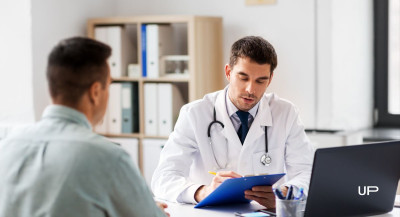TRT And Type 2 Diabetes: Can Testosterone Improve Metabolic Health?


Many men in Canada with Type 2 diabetes may also be living with low testosterone, often without knowing it.

Research shows that low T is significantly more common in men with insulin resistance, obesity, or metabolic syndrome, all of which are common in diabetes.
As testosterone levels drop, energy, mood, and muscle mass tend to decline too, which can make managing diabetes even harder. That’s why testosterone replacement therapy (TRT) in Canada is gaining attention not just for sexual health, but also for its potential metabolic benefits.
For men over 40 juggling both low T and blood sugar concerns, understanding this connection could open up new treatment options.
Topics covered in this article:
- How Type 2 Diabetes Affects Testosterone Levels
- Signs of Low Testosterone in Diabetic Men
- What the Research Says About TRT and Diabetes
- Potential Metabolic Benefits of TRT
- Risks and Considerations
- Is TRT Right for You? How to Decide
- How UPGUYS Helps in Canada
- Conclusion: Managing Low T and Diabetes Together
- Frequently Asked Questions (FAQs)
- References
How Type 2 Diabetes Affects Testosterone Levels
Type 2 diabetes, obesity, and systemic inflammation often combine in ways that lower testosterone levels in men. Multiple studies have shown that men with Type 2 diabetes frequently have significantly reduced total and free testosterone compared to non‑diabetic peers.

Here are key mechanisms involved:
- Insulin resistance suppresses natural hormone production: When the body becomes less responsive to insulin, blood sugar rises, which can disrupt the hypothalamic‑pituitary‑gonadal axis. This often leads to reduced secretion of luteinizing hormone (LH) and follicle‑stimulating hormone (FSH), which are needed to stimulate testosterone production in the testes.
- Obesity and excess fat tissue: Particularly belly and visceral fat. Fat tissue can increase the conversion of testosterone into estrogen via the enzyme aromatase, lowering circulating testosterone. Also, obesity often correlates with higher insulin resistance and reduced sex hormone binding globulin (SHBG), further reducing free testosterone levels.
- Chronic inflammation: Excess fat and high blood sugar lead to low‑grade, systemic inflammation. Inflammatory cytokines (like IL‑6, TNF‑alpha) interfere with hormone signalling and testosterone production.
- Poor glycemic control: Both high HbA1c and fluctuations in blood glucose over time are associated with lower testosterone levels. Longer duration of uncontrolled diabetes tends to correlate with more profound testosterone suppression.
Signs of Low Testosterone in Diabetic Men
Men with Type 2 diabetes in Canada may not realize they have low testosterone, since many of the symptoms overlap. Fatigue, poor energy, low libido, and reduced muscle mass are common in both conditions. That’s why testosterone deficiency in diabetic men is often overlooked or misattributed.
Key signs to watch for include:
- Fatigue that doesn’t improve with rest
- Loss of interest in sex or reduced sexual performance
- Depressed mood or increased irritability
- Decreased strength and muscle tone
- Weight gain, especially around the belly
- Poor concentration or brain fog
If you’re living with Type 2 diabetes and experience these symptoms, it’s worth discussing testosterone testing with your healthcare provider. Many men only discover they have low T after years of struggling with vague symptoms that don’t improve with standard diabetes care.
Testosterone replacement therapy (TRT) in Canada may be an option for men who meet the criteria, and it starts with proper testing and evaluation.
What the Research Says About TRT and Diabetes
In men with Type 2 diabetes and low testosterone, several studies suggest that testosterone replacement therapy (TRT) may offer metabolic benefits. The findings are promising but also point to the importance of individualized care. Key results include:
- A randomized controlled crossover trial by Kapoor et al. (2006) found that in hypogonadal men with Type 2 diabetes, TRT improved insulin resistance (measured via HOMA), reduced HbA1c, lowered fasting blood glucose, and decreased visceral fat and waist‑hip ratio.
- A more recent real‑world registry study (Kumari, 2023) showed TRT in diabetic men was associated with better glycaemic control, improved lipid profiles, and lower cholesterol and triglycerides.
- In an audit of many centres (the ABCD audit), men receiving TRT experienced reductions in insulin resistance, HbA1c, body weight, waist circumference, and improved quality of life metrics.
- Another study (Haider et al., 2020) reported that long‑term TRT in men with T2DM and hypogonadism led to significant improvements in glycemic control and insulin sensitivity, with remission of diabetes in about one‑third of participants.
Caveats and ongoing debates:
- Benefits are strongest in men who are both hypogonadal and have poor baseline metabolic health. Men without low testosterone tend to show little to no improvement in glycaemic control from TRT alone.
- Results vary depending on duration of treatment, dose, and whether TRT is combined with lifestyle changes (diet, exercise).
- There is not yet enough long‑term trial data in larger, more diverse populations to conclude how large the risks vs benefits are. Individual risks like cardiovascular health, prostate health, and hematocrit must be monitored.

Potential Metabolic Benefits of TRT
For men with both low testosterone and type 2 diabetes, testosterone replacement therapy (TRT) in Canada may offer more than just hormonal balance. When properly prescribed and monitored, TRT has been associated with several potential metabolic improvements:
- Increased energy and vitality: Low testosterone can leave men feeling chronically fatigued. TRT may help restore energy levels, making daily tasks and physical activity easier to manage.
- Improved muscle mass and strength: Testosterone supports protein synthesis and lean muscle development. Greater muscle mass helps improve insulin sensitivity, which is critical for managing blood sugar.
- Reduction in visceral fat: Studies show that TRT may help reduce abdominal fat — a major contributor to insulin resistance and cardiovascular risk in men with diabetes.
- Better motivation and mental focus: Hormonal balance often brings a mental lift. Men on TRT commonly report feeling more motivated to stay active and maintain a healthier lifestyle.
While these benefits aren’t guaranteed for everyone, many men find that treating low testosterone can positively impact both their metabolic and mental health when combined with proper diabetes management.
Risks and Considerations
While testosterone replacement therapy (TRT) in Canada may offer benefits for men with type 2 diabetes, it’s not without risks. Any treatment plan should be approached with caution and under the supervision of a licensed healthcare provider. Key considerations include:
- Cardiovascular risk factors: Some studies have raised concerns about TRT and potential heart-related side effects, especially in older men or those with pre-existing cardiovascular disease. Although newer research suggests TRT may be safe when properly monitored, the risk profile varies by individual.
- Need for medical oversight: Diabetic men considering TRT should undergo regular blood work to monitor testosterone levels, red blood cell count (hematocrit), lipid profiles, and prostate-specific antigen (PSA). Adjustments to dosage may be required based on lab results and how the body responds.
- Not a diabetes cure: TRT is not a replacement for proven diabetes treatments like glucose-lowering medications, healthy eating, or physical activity. It should be viewed as part of a broader health strategy — not a standalone fix.
Ultimately, men with type 2 diabetes and low testosterone should work closely with both an endocrinologist and a hormone specialist to weigh the potential benefits and risks of TRT in the context of their full health picture.
Is TRT Right for You? How to Decide
For men in Canada managing type 2 diabetes and experiencing symptoms of low testosterone, deciding whether to start testosterone replacement therapy (TRT) requires a careful, individualized approach. The decision should never be based on symptoms alone — proper testing and clinical evaluation are essential.
Here’s what to consider:
- Confirm low testosterone levels: Your doctor will order blood tests (usually early morning, fasting) to measure total and free testosterone levels. A diagnosis typically requires consistently low readings along with symptoms.
- Evaluate your overall health: A full review of your cardiovascular history, blood pressure, cholesterol, and diabetes control is critical before starting TRT. Men with uncontrolled heart disease or prostate issues may not be good candidates.
- Discuss realistic outcomes: TRT may improve energy, mood, and body composition, but it is not guaranteed to solve all metabolic or sexual health concerns. Your doctor should help set appropriate expectations.
- Start with a monitored plan: If you and your provider decide to begin TRT, your progress should be tracked closely through regular follow-ups and lab work. This ensures the treatment is safe and effective for your specific needs.
Working with a trusted healthcare team helps ensure that if TRT is right for you, it’s delivered safely — with your diabetes and long-term health in mind.
How UPGUYS Helps in Canada
For men in Canada exploring testosterone replacement therapy (TRT), UPGUYS makes the process simple, transparent, and accessible. Whether you're managing low testosterone alone or alongside type 2 diabetes, our platform connects you with licensed Canadian doctors who understand the importance of ongoing monitoring and personalized care.

Here’s how we support you:
- Easy access to lab testing and expert consultations: Our team provides lab requisitions and medical assessments without requiring in-person visits.
- No surprise fees: Consultations, prescription delivery, and follow-ups are included — so you know what to expect up front.
- Support for long-term management: From initial testing to regular check-ins, UPGUYS is built to support men who want to take charge of their health with confidence.
With UPGUYS, you don’t have to navigate TRT on your own. Our system is designed to keep things simple, safe, and focused on your health goals.
Conclusion: Managing Low T and Diabetes Together
Low testosterone and type 2 diabetes often go hand in hand, especially in men over 40. While testosterone replacement therapy (TRT) in Canada may offer metabolic benefits like improved energy, lean muscle, and better insulin sensitivity, it’s not a one-size-fits-all solution.
The key is proper diagnosis, medical oversight, and a long-term plan that addresses both hormone health and blood sugar management. With the right support, men can take back control of their health and feel stronger, sharper, and more balanced. If you're living with type 2 diabetes and suspect low T may be part of the picture, talk to a healthcare provider who can guide you through the next steps safely.
Frequently Asked Questions (FAQs)
Emerging research suggests that testosterone replacement therapy (TRT) may improve insulin sensitivity and support better blood sugar control in some men with low testosterone. However, it is not a primary treatment for diabetes and should only be used under medical supervision.
TRT can be safe for men with diabetes if prescribed and monitored by a licensed healthcare provider. Regular lab testing and follow-ups are important to ensure that testosterone levels, cardiovascular markers, and blood sugar are properly managed.
No. TRT is not a substitute for diabetes medication. It may complement other treatments by improving energy, body composition, and motivation to stay active—but it should always be part of a broader diabetes management plan.
Symptoms like low libido, fatigue, muscle loss, and poor mood often overlap with diabetes. A blood test ordered by your doctor is the only way to confirm whether you have low testosterone.
References
UPGUYS has strict sourcing guidelines to ensure our content is accurate and current. We rely on peer-reviewed studies, academic research institutions, and medical associations. We strive to use primary sources and refrain from using tertiary references.- Low Testosterone Levels Are Common and Associated with Insulin Resistance in Men with Diabetes, ResearchGate,
https://www.researchgate.net/publication/5533563_Low_Testosterone_Levels_Are_Common_and_Associated_with_Insulin_Resistance_in_Men_with_Diabetes - Diabetes surpasses obesity as a risk factor for low serum testosterone level, DMS Journal,
https://dmsjournal.biomedcentral.com/articles/10.1186/s13098-024-01373-1 - Inflammation in Obesity, Diabetes and related Disorders, PubMed,
https://pubmed.ncbi.nlm.nih.gov/35021057/ - Testosterone replacement therapy improves insulin resistance, glycaemic control, visceral adiposity and hypercholesterolaemia in hypogonadal men with type 2 diabetes, PubMed,
https://pubmed.ncbi.nlm.nih.gov/16728551/ - Treatment with Testosterone Therapy in Type 2 Diabetic Hypogonadal Adult Males: A Systematic Review and Meta-Analysis, PubMed,
https://pubmed.ncbi.nlm.nih.gov/36961066/ - Worldwide audit finds testosterone replacement improves blood sugar control in men with type 2 diabetes, Eurek Alert,
https://www.eurekalert.org/news-releases/1003265#:~:text=Real%2Dworld%20data%20from%20an,TRT)%20improves%20glycaemic%20control%20for - Remission of type 2 diabetes following long‐term treatment with injectable testosterone undecanoate in patients with hypogonadism and type 2 diabetes: 11‐year data from a real‐world registry study, PubMed,
https://pubmed.ncbi.nlm.nih.gov/32558149/ - Testosterone Replacement Therapy and Diabetes in Men With Hypogonadism, JAMA Network,
https://jamanetwork.com/journals/jamainternalmedicine/article-abstract/2814405
This article is written for informational purposes only and does not constitute medical advice. The information provided in the articles cannot and should not replace advice from a healthcare professional. Talk to your healthcare provider about any physical or mental health concerns or the risks and benefits of any treatment or medication.





